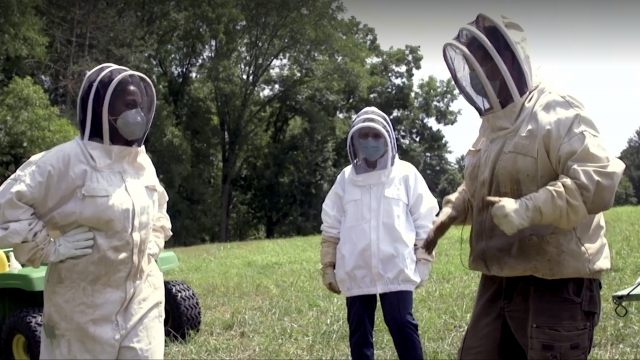In Atchison, Kansas, Sister Elaine Fischer says there's a lot you can learn from nature. Especially bees.
"They're a wonderful example of community life, which we're trying to live too, and so it's a wonderful teaching tool for me," said Fisher.
Each worker bee helping out, depending on each other for life. Fischer maintains the massive hives at Mount St. Scholastica Benedictine Sisters, part of the monastery's efforts to live a life of sustainability. The monastery also takes advantage of solar energy and has a system that reuses rainwater.
"They all go into the gutters and it goes down into a big cistern," said Fisher. "And then we have a pumping system in this building here."
The cistern, installed more than 100 years ago to store rainwater for everyday use, turned out to be good intuition for a modern problem. When the city put water restrictions in place, the sisters say they never had to worry.
"This part of the country is going to probably be in 40, 50 years more like Louisiana is today," said meteorologist Sean Sublette. "It's going to be hotter and more humid, fairly consistently during the late spring."
Sublette works with Climate Central, an organization that researches and reports on the changing climate.
"These places that have been growing the same kind of stuff for four generations are going to have to grow it anymore a couple of generations from now" said Sublette.
For these sisters, sustainability and planning ahead isn't a new concept. In fact, it isn't a unique concept for many of the Catholic communities in these parts.
At St. Benedict's Abbey, Brother Karel Soukup is just one of the voices that make up the daily vespers. But singing isn't his only talent. He also turns fallen trees into works of art.
"More than anything, I think it allows people to sort of see a glimpse of what monasticism is all about," said Soukup.
Monks here get to choose how they want to contribute to the community. And while Soukup has woodworking, brother Maximillian is into brewing beer — enough to sustain the monks and create a sense of togetherness.
"Learning more about the process of brewing beer has made me ask questions," said Maximillian. "Like what the purpose of my doing it for the community is, because it's not just about saving money. ... So I suppose the whole point of monks having hobbies is ... it gives you a practical arena in which you kind of experience God's providence."
Just an hour and a half away, the Benedictine Sisters of Perpetual Adoration are following in the same footsteps.
The wind turbines are one of the most obvious examples, but the sisters here say the grounds are full of efforts to be good stewards of the Earth.
For those in the Benedictine order, like these three groups, it's not only a good thing to do, it's instruction for life.
"Treating all things as vessels of the altar," said Sister Elizabeth Carrillo of Mount St. Scholastica Benedictine Sisters. "Those are really foundational kind of stances for us. And I think as Benedictus, as we kind of widen our sense of who is Christ, you know, it's not just the human community. It's the Earth community as well."
The orders have been here for more than 100 years, so the future of this land matters to them and those who follow.
"It's about helping the environment. And then also just kind of doing a really cool thing," said Sister Ruth Elaine Starman of the Benedictine Sisters of Perpetual Adoration.


